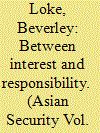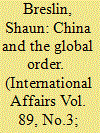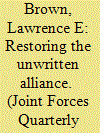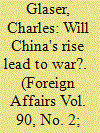| Srl | Item |
| 1 |
ID:
091578


|
|
|
|
|
| Publication |
2009.
|
| Summary/Abstract |
This article is situated within the contemporary debates about the nature and purpose of China's growing power. It uses the concepts of "national interest" and "international responsibility" as a framework of analysis for Chinese foreign policy, and develops a three-dimensional typology to conceptualize their relationship (antagonistic; instrumental; mutually constitutive). This article adopts two main arguments. First, a stronger China is one gravitating toward greater notions of international responsibility, albeit instrumentally. Second, observable trends in China's evolving worldview indicate, however, that it is conceiving its national interests more broadly, embracing further socialization and greater normative commitments to international society. One may therefore view China's burgeoning global role as a great power with a degree of "cautious optimism."
|
|
|
|
|
|
|
|
|
|
|
|
|
|
|
|
| 2 |
ID:
120538


|
|
|
|
|
| Publication |
2013.
|
| Summary/Abstract |
Although there is clear dissatisfaction in China with the nature of the current global order, it is hard to find a clear and coherent Chinese vision of what an alternative world might look like. This is partly a result of conflicting understandings within the country of the benefits and drawbacks of taking a more proactive global role and perhaps undertaking more leadership functions. But it is also a consequence of how elites frame Chinese interests and demands in different ways for different audiences.
Furthermore, the existing order has in fact served China quite well in its transition towards becoming a global power. So while at times China appears to be the main driver for reform and change, at other times (or to other people) the emphasis is on China as a responsible stakeholder in the existing system.
How others receive and interpret these conflicting signals is likely to be influenced by the way China exercises, rather than talks about, its growing power - perhaps most notably in terms of its territorial claims in the South and East China Seas and its role as a regional power.
|
|
|
|
|
|
|
|
|
|
|
|
|
|
|
|
| 3 |
ID:
128791


|
|
|
| 4 |
ID:
101906


|
|
|
|
|
| Publication |
2011.
|
| Summary/Abstract |
Realist international relations theorists usually would predict that the basic pressures of the international system will force the United States and China into conflict. But properly understood, realism offers grounds for optimism in this case, so long as Washington can avoid exaggerating the risks posed by China's growing power.
|
|
|
|
|
|
|
|
|
|
|
|
|
|
|
|